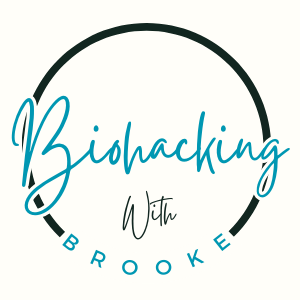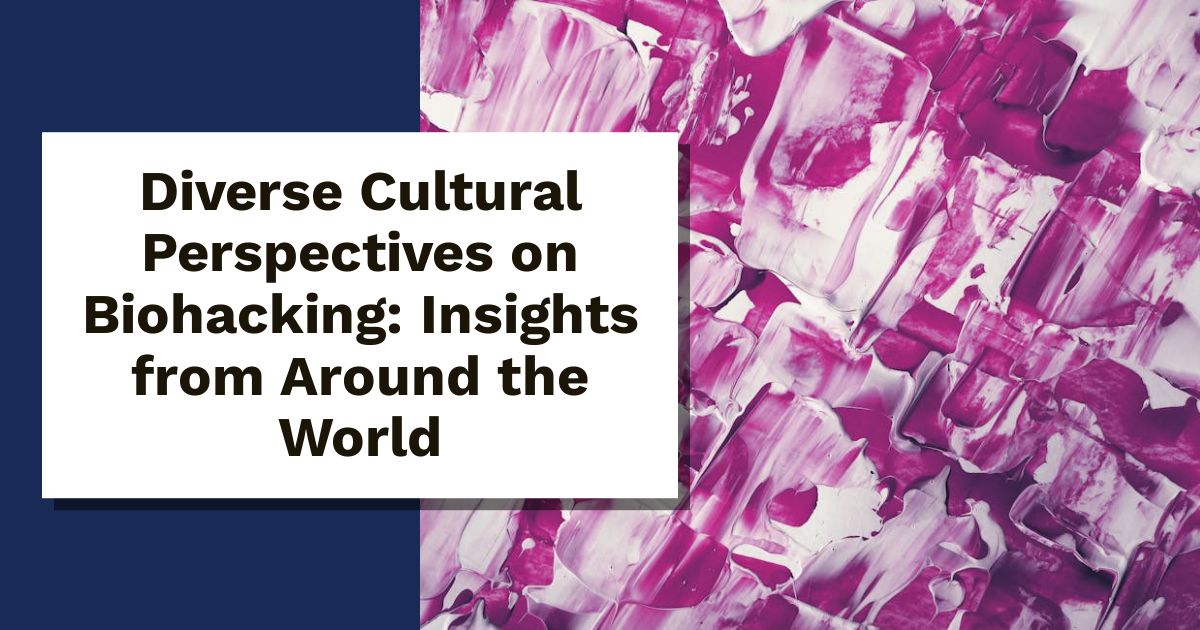Biohacking is gaining popularity as more people seek ways to optimize their bodies and minds. But did you know that cultural backgrounds shape how folks approach biohacking?
From ancient practices to modern techniques, diverse cultures bring unique perspectives to this trendy topic. Some embrace herbal remedies, while others turn to tech wearables. Each viewpoint offers valuable insights that enrich the biohacking conversation.
In this post, we’ll highlight various cultural practices and beliefs surrounding biohacking. You’ll discover how these perspectives can inspire your own journey. Buckle up as we explore how culture influences this fascinating movement!
What is Biohacking?
Biohacking is an exciting way for people to take control of their health and performance. The term refers to various practices that aim to improve biological function. From lifestyle changes to technology integration, biohacking encompasses multiple approaches tailored to individual needs. Whether it’s adjusting your diet, incorporating supplements, or exploring tech wearables, biohacking gives you the power to optimize your life.
The Basics of Biohacking
At its core, biohacking is about experimentation. People use different techniques to see what works best for them. Here are a few popular methods:
- Nutritional Changes: Many biohackers tweak their diets to enhance energy levels. This can mean trying out keto, intermittent fasting, or plant-based eating.
- Sleep Optimization: Quality sleep is crucial for overall health. Many use tools like sleep tracking apps or adjust their sleep environments to wake up refreshed.
- Exercise Modifications: Short bursts of intense workouts, like HIIT, are often favored. These quick sessions can yield impressive results in a fraction of the time.
- Mindfulness Practices: Meditation and mindfulness techniques help improve focus and emotional well-being.
These options are just the tip of the iceberg in the biohacking world. Medical News Today provides a comprehensive overview of various techniques and hacks you can try.
Types of Biohacking
Biohacking isn’t one-size-fits-all. There are several types of biohacking, each with unique goals and methods. Here’s a breakdown:
- Nutrigenomics: This focuses on how your genes affect your nutritional needs. By understanding your genetic makeup, you can fine-tune your diet for the best results.
- DIY Biology: This type often attracts scientists and enthusiasts alike. It involves conducting experiments on oneself to gather personal data.
- Quantified Self: This involves using technology to track and analyze various aspects of your life, like sleep patterns or exercise routines. Many use apps and wearables to gather this data.
Each type provides an opportunity to learn more about one’s body and make informed decisions. For those curious about examples and practical applications, InsideTracker offers valuable insights.
The Role of Technology
Technology plays a crucial part in modern biohacking. Devices like fitness trackers, smartwatches, and even apps provide real-time data on health metrics. This information allows individuals to make quick adjustments. Think of it like having a personal coach in your pocket!
Devices that monitor heart rate or sleep quality help you understand what influences your health. From there, you can create a custom strategy to improve your physical and mental well-being. For a deeper dive into how technology enhances biohacking, check out Scripps Health.
Biohacking is about exploring what makes you feel your best. With the right tools and knowledge, you can embark on this journey toward a healthier, more vibrant life.
Cultural Attitudes Toward Biohacking
Cultural perspectives shape how people approach biohacking. In the West, fascination with technology and health thrives. Conversely, Eastern perspectives often embrace holistic practices. Indigenous wisdom brings ancient traditions into the mix. Let’s explore these cultural attitudes and how they influence the conversation around biohacking.
Western Perspectives
In the Western world, biohacking takes a tech-driven approach. People focus on using gadgets and apps to boost health. Fitness trackers, smartwatches, and even DIY biology labs flourish. This fascination with technology often links with a desire for efficiency and control over one’s health.
- Personal Optimization: Many in the West view biohacking as a method for personal enhancement. Whether it’s tweaking diets or optimizing sleep, there’s a focus on measurable outcomes.
- Self-Tracking Culture: Self-tracking through wearables has created a culture of data enthusiasts. Gadgets like heart rate monitors and sleep trackers help users understand their bodies better. This data encourages experimentation and self-discovery.
For deeper insights into how Western culture views biohacking, check out Between Self-Tracking and Alternative Medicine, which highlights the interplay between self-tracking and alternative health practices.
Eastern Influences
Eastern cultures often integrate holistic approaches into biohacking. Here, the focus shifts to balance, energy, and natural healing. Various practices like yoga, meditation, and herbal remedies are prevalent.
- Mind-Body Connection: Many Eastern perspectives emphasize the connection between mind and body. Techniques like mindfulness and meditation are used to achieve mental clarity and physical well-being.
- Sustainable Practices: Instead of quick fixes, there’s an appreciation for long-term health benefits. Methods such as Traditional Chinese Medicine (TCM) look at health through a lens of balance and harmony.
To learn more about cultural differences influencing biohacking, explore the Biohacking: An Exploratory Study which highlights the factors that affect biohacking practices.
Indigenous Wisdom
Indigenous cultures offer rich wisdom that can inform modern biohacking. These traditions often focus on holistic health, community, and a deep respect for nature. Practices include herbal medicine, storytelling, and rituals that promote well-being.
- Holistic Healing: Indigenous wisdom emphasizes viewing health as a whole. Practices reflect a belief that physical and mental health are interconnected.
- Community & Environment: These perspectives often include a sense of community. People engage in healing practices that extend beyond individual well-being, focusing on the health of the community and environment.
To explore how Indigenous traditions connect to modern biohacking, visit Biohacking and Indigenous Wisdom, which discusses the intricate relationship between cultural heritage and health practices.
Cultural attitudes toward biohacking vary widely, reflecting the diversity of human experience. Each perspective contributes something unique, enriching the biohacking conversation and offering new paths for exploration.
Innovative Biohacking Practices Around the World
Various cultures have unique biohacking practices that reflect their beliefs, environments, and lifestyles. Let’s take a look at a few fascinating approaches, showcasing how people optimize their well-being across the globe.
The Nordic Approach
Nordic countries have a strong focus on mental and physical wellness. Their approach combines outdoor activity, social connection, and a balanced lifestyle. Here’s how they do it:
- Nature Connection: The people prioritize time outdoors. Activities like hiking and skiing aren’t just hobbies—they’re crucial for mental health.
- Healthy Diet: The Nordic diet emphasizes whole foods, fish, and seasonal produce. It’s about eating fresh and locally sourced ingredients.
- Simplicity in Life: With a focus on minimalism, there’s less stress. The concept of “velvære” captures this well-being philosophy, advocating for a holistic lifestyle that promotes balance and happiness. Learn more about The Nordic Approach to Health and Fitness to see how these principles are applied.
Japanese Techniques
In Japan, practices like Shinrin-yoku, or forest bathing, lead the way in biohacking. This tradition encourages immersing yourself in nature to improve well-being. Here’s why it matters:
- Immersive Experience: During Shinrin-yoku, you walk mindfully in a forest, reconnecting with nature. This act can significantly lower stress levels and enhance mood.
- Health Benefits: Studies show that forest bathing can boost your immune system, increase energy, and even lower blood pressure. It’s like a natural reset for the body!
- Cultural Roots: This practice builds on the Japanese belief that nature offers healing and revitalization. Explore the benefits of forest bathing through National Geographic’s insights to see its widespread relevance.
African Traditional Medicine
African traditional medicine is rich with herbal remedies and community healing practices. These methods often emphasize holistic care and community wellness. Here are some key elements:
- Herbal Knowledge: Many practitioners use indigenous plants for healing. They focus on natural remedies that address both physical and emotional health.
- Community Focus: Healing often involves family and community. This collective approach fosters strong social bonds and support, essential for mental health.
- Cultural Significance: Traditional medicine is not just about the remedies; it is also about cultural identity and historical wisdom. For deeper insights into how traditional African medicine intersects with modern practices, visit Traditional African Medicine Meets Modern Tech.
These innovative biohacking practices from diverse cultures showcase the many ways people can enhance their health and well-being. Engaging with these traditions can inspire new avenues for personal growth and wellness.
Biohacking Ethics in Different Cultures
Biohacking raises various ethical questions across cultures. As people explore ways to optimize their biology, they face unique moral dilemmas shaped by their cultural backgrounds. Let’s look into how different regions approach the ethics of biohacking.
Western Ethical Concerns
In Western cultures, ethical debates around biohacking often focus on privacy and enhancement. Here are key points to consider:
- Privacy Issues: With data collection growing, privacy is a huge concern. Many worry about how personal health data is stored and used. The balance between using technology for improvement and preserving individual rights is delicate.
- Enhancement vs. Normalcy: The line between healthy optimization and competitive enhancement is blurry. Should society allow people to enhance their bodies artificially? Ethical implications arise when considering equity and access to enhancement technologies.
- Regulatory Frameworks: There’s a push for regulations around biohacking practices. Experts advocate for oversight to ensure ethical compliance. For deeper insights, explore the article on Oversight of biohacking when the stakes are high which discusses the balance of risks and personal freedom in biohacking.
Eastern Philosophical Views
Eastern philosophies influence the ethical landscape of biohacking. Here are some of their core beliefs shaping this field:
- Harmony and Balance: Many Eastern teachings focus on achieving balance in life. Techniques that emphasize holistic healing align with these views. The approach isn’t just about enhancement; it’s about well-being in multiple aspects.
- Collective Well-Being: Individual health is tied to the community’s wellness. This perspective encourages practices that benefit everyone, moving away from purely individualistic goals.
- Mindfulness: Practices like meditation are seen as essential to biohacking. They nurture mental clarity, influencing ethical decisions. To dive deeper, check out Eastern philosophies might have been right about the self to see how these ideas relate to self-optimization.
Indigenous Perspectives on Ethics
Indigenous cultures place great importance on ethics regarding nature and community. Their views enrich the conversation around biohacking:
- Interconnectedness: Indigenous beliefs often emphasize the connection between people and nature. This view influences how biohacking practices are developed and tested.
- Respect for Tradition: Using traditional knowledge in biohacking practices is vital. Many Indigenous communities adhere to principles that respect their heritage and the environment, promoting sustainability alongside health.
- Community-Centric Practices: Healing methods bring community support to the forefront. Health isn’t just an individual pursuit; it’s tied to collective health outcomes. Learn more about these insights by reading Biohacking and the Indigenous Wisdom which discusses how these cultural values shape modern health practices.
These perspectives show how diverse cultural backgrounds shape the ethical conversations around biohacking. Each viewpoint offers valuable insights that inform moral considerations in this evolving field.
The Future of Biohacking Globally
As the world becomes more interconnected, biohacking will benefit from global collaboration. Different cultures can share their unique practices and insights, creating a vibrant tapestry of ideas. This exchange encourages innovation while respecting traditions. By coming together, biohackers from various backgrounds can learn from one another, enriching their experiences.
Global Collaboration
Biohacking thrives on diverse ideas. Imagine a tech enthusiast from Silicon Valley teaming up with herbal healers from traditional cultures. Each brings something unique to the table. This collaboration can lead to incredible advancements, like blending modern technology with ancient wisdom.
- Shared Knowledge: Cultures can share insights on various biohacking techniques, from dietary practices to mental wellness strategies. Sharing these ideas enhances understanding and expands the toolkit for optimization.
- Joint Research Initiatives: Global collaborations can lead to joint research projects that explore the efficacy of different biohacking methods. These partnerships can result in ground-breaking findings and practices.
- Cultural Exchange: Events like biohacking festivals provide a platform for practitioners to showcase their methods. Engaging with other cultures allows for a cross-pollination of ideas, benefiting everyone involved.
With increased collaboration, the biohacking community can harness a wealth of knowledge. Explore more on how such teamwork is shaping the future of biohacking in The Rise of Biohacking: How Biotech Startups are Empowering Individuals.
Potential Risks and Rewards
With innovation comes risk. Biohacking can lead to significant health benefits, but it can also pose dangers. It’s essential to maintain balance when exploring new techniques.
- Health Benefits: Proper biohacking techniques can enhance physical performance, improve mental clarity, and promote overall well-being. When done safely, the rewards can be life-changing.
- Risk of Injury: Some methods may cause harm. For instance, extreme dietary changes or untested supplements can lead to unwanted side effects. It’s vital to research thoroughly before trying new approaches.
- Ethical Concerns: The quest for optimization may lead to ethical dilemmas. Questions about accessibility and fairness arise when advanced techniques are available only to a select few.
Being aware of these potential risks helps practitioners navigate the biohacking landscape wisely. For more information on safety and ethical considerations, read about Biohacking: medical promises or ethical perils?.
In exploring the future of biohacking, it’s crucial to balance innovation with caution. By embracing collaboration and being aware of the risks, the biohacking community can thrive globally.
Conclusion
Cultural perspectives play a significant role in shaping how we approach biohacking. Each culture, with its unique practices and beliefs, offers valuable insights that broaden our understanding of health and wellness.
By exploring diverse approaches, you can find inspiration that resonates with your own journey.
Whether it’s ancient wisdom or modern techniques, every perspective can enhance your biohacking experience.
So, why not dive into these varied traditions? Embrace the richness of global biohacking practices and discover new ways to optimize your well-being!
Brooke is a rock-climbing 🧗♀️, tennis-playing 🎾, biohacking 🧬 bookworm 📚 on a mission to unlock the secrets of health, longevity, and living life to the fullest 🌟. When she’s not scaling cliffs, hitting the courts, or testing out the latest hacks, you’ll find her nose in a book or adventuring with her four-legged best friend 🐕 by her side. With a knack for turning science into simple, actionable tips, Brooke’s writing is your guide to hacking your biology and living your best, most vibrant life!


